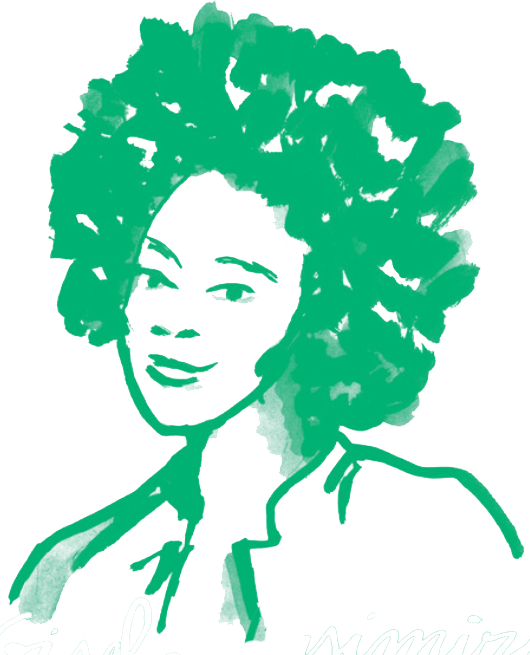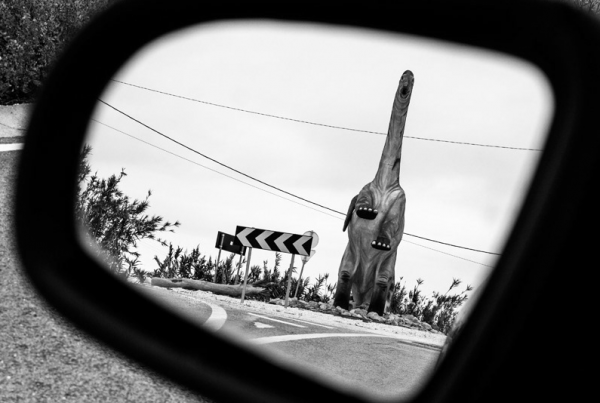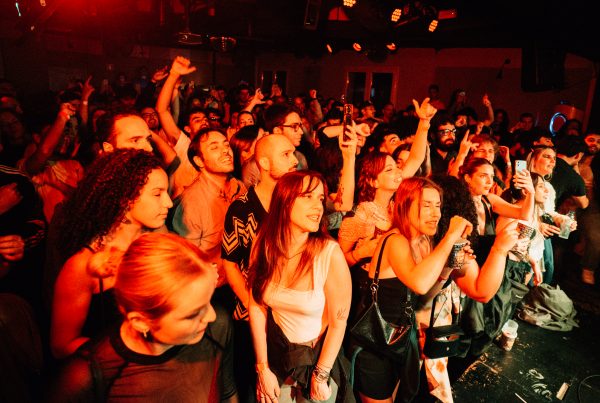
Gisela Casimiro is a writer and artist. She was born in 1984 in Guinea-Bissau. She is a columnist for the Hoje Macau newspaper and contributes to the Buala portal and Decadente magazine. She published Erosão (poetry) in 2018 through publishing house Urutau. In theatre, she participated in Longo Curso (2016), ATLAS Lisboa (2017), Fausto (2018) and A Paixão Segundo São Mateus (2019). She is the head of INMUNE’s department for culture – The Institute of Back Women in Portugal.
Já não estou no National Theatre, em Londres, para assistir a Three Sisters, uma adaptação de Tchekhov escrita por Inua Ellams, nigeriano, e representada por um elenco inteiramente negro. Sarah Niles, Racheal Ofori e Natalie Simpson poderiam bem ser Cleo Tavares, Isabél Zuaa e Nádia Yracema, as Aurora Negra. Se, por momentos, Moscovo é Lagos, também Guiné, Angola ou Cabo Verde poderiam ser Reino Unido, Luxemburgo, França, Estados Unidos. A novíssima geração de artistas portugueses afrodescendentes com projecção internacional é composta por filhos e filhas de quem, tendo escolhido primeiramente Portugal, se viu depois forçado a começar de novo num outro país: “Escravas à mesma mas língua diferente”, canta Nenny em homenagem à sua mãe, Dona Maria como o Teatro Nacional onde, em breve, estreará Aurora Negra, um espectáculo no feminino, vencedor da bolsa de criação Amélia Rey Colaço.
Numa nova curta-metragem de Welket Bungué, BUSTAGATE, Isabél Zuaa e Cleo Tavares traduzem para a performance os sentimentos que a agressão a Cláudia Simões e, sobretudo, a morte de Luís Giovani gravaram em cada um de nós. Não, já não estou em Londres, a passear pelas ruas que Amy Winehouse percorreu. Estou em Lisboa, alguém canta Valerie de forma irrepreensível: eis Amaura, uma voz que alimenta de tão cheia. Por seu lado, Judas é modelo, bailarino, cantor. Glitter, perucas, unicórnios insufláveis, asas douradas são alguns dos acessórios que exibe nos vídeos, em contraste com o ar sóbrio da capa do seu disco, Primogénito. Entre o pop e o rap, com momentos de soul, fado ou reggae, não se coíbe em mostrar o que consegue fazer. A sua queerness é visível no estilo e na escrita, e talvez por isso lhe fique tão bem este Cubismo Enviesado com que compete no Festival da Canção, sob mentoria de Hélio Morais, músico dos Linda Martini e dos PAUS.
Amor, prazer, corpo, dinheiro, imigração, colorismo são alguns dos temas transversais a estes artistas de bússola muito própria. Judas não foi o único a sonhar com as luzes da ribalta: “O artista em mim era o que me fazia viver/ Ninguém acredita que nasceste para mudar a sociedade.” Vindos de bairros como Vialonga, Mercês ou Apelação, trabalhando em lojas de roupa, bares ou vendas porta a porta, estes artistas já passaram por várias profissões paralelas e, por vezes, castradoras.
As rappers e cantoras Carla Prata, Cintia e Mynda Guevara poderiam ser inspiração para a série African Heroes da ilustradora Darsy Fernandes, com a sua calma, os cabelos naturais, as roupas que não olham a género. Quem também tem agitado as nossas noites é Ronaldo Rómulo: animador, DJ, personal stylist, consultor de moda. O que encerram um punho erguido e a voz que move uma sala? A história de quem viveu longe dos pais enquanto a guerra não terminou no seu país. “Participa na História”, urge gritar. “Isto não é só hip-hop”, avisa Nenny, para o caso de alguém ainda andar distraído. O futuro é “young, gifted and black”, já dizia Nina Simone. Estes artistas vão ser tudo o que quiserem ser, e tudo o que os seus poderiam ter sido.
English Version
Black Diamond, Transparent Soul
I’m no longer at the National Theatre, in London, to watch Three Sisters, an adaptation of Chekhov by Nigerian writer Inua Ellams, played by an all-black cast. Surely, Sarah Niles, Racheal Ofori and Natalie Simpson could be Cleo Tavares, Isabél Zuaa and Nádia Yracema, the Aurora Negra [Black Dawn]. If, for a moment, Moscow is Lagos, then Guinea, Angola or Cape Verde could also be the United Kingdom, Luxemburg, France or the United States. The new generation of Portuguese artists of African descent with international exposure is composed with sons and daughters of those who first chose Portugal but had to start all over again in another country: “Still slaves but a different language”, sings Nenny in tribute to her mother, Dona Maria, which is also the name of the National Theatre where Aurora Negra, an all-female performance, winner of the Amélia Rey Colaço creation grant, will soon be premiered.
In Welket Bungué’s new short movie, BUSTAGATE, Isabél Zuaa and Cleo Tavares convey in their performance the feelings that the assault on Cláudia Simões and, especially, the death of Luís Giovani, have engraved in us. Indeed, I’m no longer in London, strolling along the streets following in Amy Winehouse’s footsteps. I’m in Lisbon, someone is singing Valerie unerringly: Amaura, a rich voice that nurtures. As for Judas, he is a model, a dancer and a singer. Glitter, wigs, inflatable unicorns, gilded wings are some of the accessories that he uses in his video clips, in sharp contrast with the sober look of his record cover, Primogénito. At the crossroads between pop and rap music, with soul, fado or reggae moments, he doesn’t shy away from showing what he can do. His queerness is visible from his style and writing, and this is probably why he embodies so well Cubismo Enviesado, the song he will compete with at the Festival da Canção [Song Contest], under the mentorship of Hélio Morais, musician of Linda Martini and PAUS.
Love, pleasure, body, money, immigration and colorism are amongst the cross-cutting themes explored by these artists who follow their own, unique compass. Judas wasn’t the only one dreaming of footlights: “The artist in me was my reason to live/ Nobody believes that you were born to change society.” Coming from neighbourhoods such as Vialonga, Mercês or Apelação, working in clothing shops, bars or as door-to-door sellers, these artists have worked in many parallel, sometimes frustrative, trades.
Rappers and singers Carla Prata, Cintia and Mynda Guevara could be the inspiration for the series African Heroes from illustrator Darsy Fernandes, with their calm attitude, natural hair style and gender-neutral clothes. As an entertainer, DJ, personal stylist, fashion consultant, Ronaldo Rómulo has also been pumping our nights up. What can be hiding behind a fist raised in the air and the voice that stirs the crowd up? The story of someone who lived far away from his parents when war was raging in his country. “Take part in history”, it’s urgent to shout out. “This is not just hip-hop”, warns Nenny, in case some are still being distracted. Nina Simone used to say: the future is “young, gifted and black”. These artists are going to become everything they want to be, and everything their parents could have become.
/ Translation by Saoussen Khalifa



